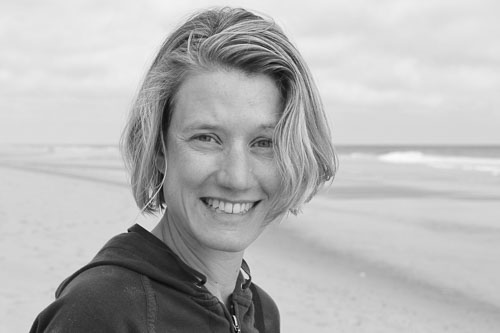x
Story Hour at the Monkey House Bar
The rule is that the story
must belong to the teller
last five minutes
and be spoken without notes.
So it’s a surprise when
in the stranger’s tale
your mother appears
disguised as a ringing phone
and your chest
a field of grain.
The teller emerges gradually,
as if whittled from a block of wood.
Then applause
burnishes and clarifies.
Did you see the moment
when the speaker’s face
became boundless
and complete in the same breath?
Each story lives as a cairn in the forest,
an arrangement that says
I was here, but am no longer.
x
x
Lost Season
winter didn’t come
the lake remained open and moving
the robins never left
we waited for the muffling
for snow to fall through the hours
absorb all the hum and clang
crows failed to gather
high in the bare trees
and something happened
to our sleep to our ground
all that couldn’t go dormant
strained in the growing light
the pull from freeze to thaw
went slack and the sap
held back in the maple
we needed one another less
no bitter wind to recoil from
nothing to crack or loosen
so we said what would
have been left to silence
and felt our old lives forget us
x
x
Carry
Fear settles in the body at variable densities
depending on levels of iodine
or derision in your parents’ conversation.
We get exhausted differently.
While you travel from Kenya to Vietnam
I will head to the dark end
of the hallway.
We were told the stitches would dissolve.
A small white pill was prescribed
to quiet the windows in their frames.
Can you see how time is tearing through me like a storm?
We were told the memories
would slowly fracture and become absorbed.
The you in this poem is you
and the narrator a woman whose hands are cracking.
x
x
Your Last Winter in Savannah
We cut a path through the sabal palms
though soon you will leave them.
Here your past isn’t thick –
and finer still, tomorrows:
delicate Spring plumage of the night heron
thin shadows of live oaks with sprays of Spanish moss
air touching everything lightly.
The ancestors here do not belong to us, are strangers.
Time now when you don’t want any more surprise
no more beginnings.
You said, watch the wood storks as they circle,
their grace disappears so utterly when landing.
Hard to decipher the dank smell of the paper mills
from the old salt of the marshland.
Soon we’ll forget both and in our absence
the nests of these egrets will fall, stick by stick.
x
x
My Sister’s City
Tall buildings put us in the shade
for most of the day, blunt edges
pushing hard against the soft curve of sky.
We move among the snarl and the slow
renovation, protected by and sealed off by
scaffoldings. So much conversion.
The disconcerting brush of many glances
as up through the muscles of my legs
I feel the rumble and groan of an undercity
and all its trespassers.
If I find a bench and sit with my sister
in a comforting beam of sunlight
then who can I believe has really
been a member of the same audience?
This is not like home
with all its debts and ashes.
Here I could be reinvented
while cement cutters grind at our lives
like precious stones.
—Alison Prine
x
Alison Prine’s debut collection of poems, Steel, was chosen by Jeffrey Harrison for the Cider Press Review Book Award and was released in January 2016. Her poems have appeared in The Virginia Quarterly Review, Shenandoah, Green Mountains Review, and Prairie Schooner among others. She lives in Burlington, Vermont where she works as a psychotherapist.
x
x
